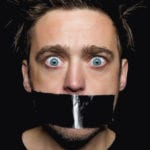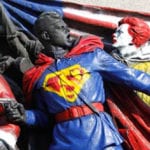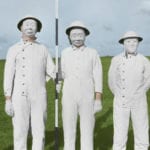 Movies and TV
Movies and TV  Movies and TV
Movies and TV  Health
Health 10 Miraculous Advances Toward Curing Incurable Diseases
 Miscellaneous
Miscellaneous 10 Undeniable Signs That People’s Views of Mushrooms Are Changing
 Animals
Animals 10 Strange Attempts to Smuggle Animals
 Travel
Travel 10 Natural Rock Formations That Will Make You Do a Double Take
 Movies and TV
Movies and TV 10 Actors Hidden in Your Favorite Movies
 Our World
Our World 10 Science Facts That Will Change How You Look at the World
 Pop Culture
Pop Culture 10 Incredible Female Comic Book Artists
 Crime
Crime 10 Terrifying Serial Killers from Centuries Ago
 Technology
Technology 10 Hilariously Over-Engineered Solutions to Simple Problems
 Movies and TV
Movies and TV 10 Movie Adaptions That Brought Popular Songs to Life
 Health
Health 10 Miraculous Advances Toward Curing Incurable Diseases
 Miscellaneous
Miscellaneous 10 Undeniable Signs That People’s Views of Mushrooms Are Changing
Who's Behind Listverse?

Jamie Frater
Head Editor
Jamie founded Listverse due to an insatiable desire to share fascinating, obscure, and bizarre facts. He has been a guest speaker on numerous national radio and television stations and is a five time published author.
More About Us Animals
Animals 10 Strange Attempts to Smuggle Animals
 Travel
Travel 10 Natural Rock Formations That Will Make You Do a Double Take
 Movies and TV
Movies and TV 10 Actors Hidden in Your Favorite Movies
 Our World
Our World 10 Science Facts That Will Change How You Look at the World
 Pop Culture
Pop Culture 10 Incredible Female Comic Book Artists
 Crime
Crime 10 Terrifying Serial Killers from Centuries Ago
 Technology
Technology 10 Hilariously Over-Engineered Solutions to Simple Problems
Top 10 Times The British Corona Cops Abused Their Powers
History shows us that assaults on human rights all too often occur during times of extraordinary crisis. The coronavirus pandemic is no different. The British government afforded the cops a powerful, new toolkit with which to detain those accused of violating quarantine rules. Rushed legislation, including the Coronavirus Act 2020, allowed the police to use “reasonable force” to make members of the public comply with lockdown orders. And updates to the Health Protection Regulations meant citizens could no longer leave their own homes without “reasonable excuse.” The constabulary embraced these new powers with remarkable zeal.
Top 10 Tone-Deaf Celebrity Coronavirus Messages That Are Cringey AF
Many forces began investigating the minutiae of everyday life, taking an unprecedented interest in the public’s shopping habits, exercise routines, social behaviors, and means of travel. Citizens were punished for spending too long outdoors. Police vans patrolled park benches and shopping precincts. The “non-essential” activities of walkers and sunbathers were chronicled across police Twitter accounts, shaming the non-compliant.
But it soon became clear that many constabularies were abusing their new powers. In May, it was discovered that every single charge made under the Coronavirus Act was wrongful. The media reported on cases of cops arresting people for sitting on park benches. And the British Home Secretary was forced to remind officers that they were supposed to police by consent. With this in mind, let us take a look at just 10 occasions when the British corona cops went too far.
10 Clamping Down on Easter Eggs
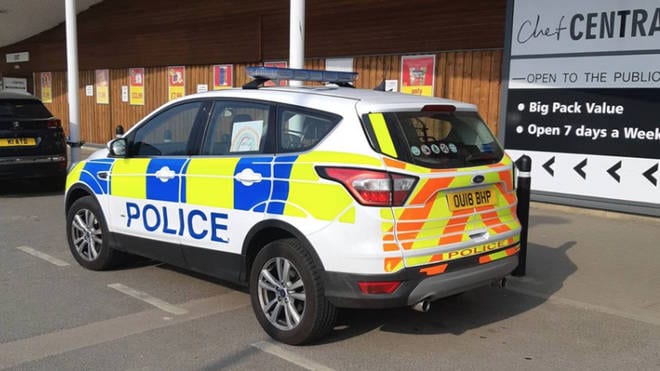
At the height of Britain’s coronavirus emergency, the government ordered the closure of cafes, restaurants, outdoor markets, and other “non-essential” businesses. While convenience stores remained open to the public, some officials started to enforce trading rules that did not even exist.
Gloucestershire cops quickly descended upon the Gloucester Retail Park. The force deployed a CCTV vehicle to observe the shopping habits of locals. The officers then admonished customers for purchasing non-essential items. “Essential journey? Some items on our list so far… paint, top soil, a sat-nav, an Easter egg, a scratch card, bamboo fencing, stone chippings,” tweeted the Gloucester City Police. “Ask yourself if it’s really necessary. Help save lives and stay at home.”[1]
Meanwhile, Northamptonshire Police Chief Nick Adderley cautioned that non-compliant citizens could face tougher restrictions. “We will not, at this stage, be setting up road blocks. We will not, at this stage, start to marshal supermarkets and checking the items in baskets and trolleys to see whether it’s a legitimate, necessary item,” Adderley explained. “But again, be under no illusion, if people do not heed the warnings and the pleas I’m making today, we will start to do that.”[2]
Cambridge Police went further, dispatching officers to check the “non essential aisles” of grocery stores. “Good to see everyone was abiding by social distancing measures and the non essential aisles were empty,” tweeted the force. The constabulary backtracked, with a spokesperson arguing that the social media post was made by an “over exuberant” officer.
The Association of Convenience Stores (ACS) said it had received multiple reports of officials instructing stores not to sell Easter eggs and hot-cross buns. The head of the ACS, along with the British Home Secretary, told the cops there were no new restrictions on what essential retailers could sell.
9 Issuing Fines for Chalking
A London bakery recently introduced safety measures to protect customers from the coronavirus. On March 27, the owners of Grodzinski Bakery in Edgware sprayed social-distancing markers on the sidewalk. It was hoped this would keep customers at least two meters apart when queuing outside the bakery. But the measures caught the attention of one eagle-eyed Metropolitan Police sergeant. The cop argued that the social-distancing lines were a form of graffiti, before issuing a ticket for criminal damage. The bakery manager remonstrated with the officer, explaining that the markers were made up of temporary, spray-on chalk.
A confused bystander asks the officer if he feels comfortable issuing the ticket. “Yes, sir, because the law is the law,” the sergeant responded. “It doesn’t change just because of what’s happening. Otherwise there would be anarchy in the world.” The cop then instructs the bakery owner to remove the markers. The Metropolitan Police eventually reversed course after footage of the incident went viral. The ticket was ultimately scrapped.[3]
8 Following Citizens with Drones
The deployment of surveillance technologies is becoming increasingly common in modern Britain. Police constabularies are now armed with sophisticated aerial drones, capable of collecting live video feeds and thermal images. During the recent coronavirus outbreak, the police used these drones, along with roadblocks, to ensure citizens followed social distancing rules and avoided unnecessary journeys.
The Coronavirus Act 2020 granted the police new powers to force residents to return to their homes. Meanwhile, the Civil Aviation Authority relaxed drone safety rules, affording officers more effective jurisdiction over beaches, parks, and residential areas.[4]
The nature of this legislation came into sharp focus when the Derbyshire Police launched drones to spy on unsuspecting walkers. The drones followed citizens through their hikes in the Peak District, a secluded park in rural England. The police also used the devices to obtain the license plate numbers of vehicles in a nearby parking lot. “Some number plates were coming back to keepers in #Sheffield, so we know that people are travelling to visit these areas,”[5] tweeted the boys in blue. The police posted footage of the walkers on Twitter, editing the video to include motion graphics and captions. “Walking your dog in the Peak District. Not essential,” stated one caption. “Heading to the Peaks to watch the sunset. Not essential,” said another.
7 Flipping a Barbecue

On March 24, neighbors of an apartment complex in Coventry, England, were busy preparing an outdoor barbecue. But the local bobbies caught scent of the group’s delicious cooking and arrived in force. Discovering a group of around 20 people, the West Midlands Police officers instructed the group to disperse.
The group claimed it was within its rights to continue the barbecue. “My children need to eat,” pleaded one woman. When it became clear the residents would not back down, the officers walked up to the barbecue and flipped it on its side. For good measure, the cops took a photo of their handiwork. The image, showing food and charcoal strewn across the ground, was uploaded to the West Midlands Police website. “Our officers were forced to tip the BBQ over as the defiant group initially refused to leave,”[6] read the caption.
Only, the police action was not entirely mandated. The Health Protection Regulations 2020 did not come into effect until several days later, meaning the officers had no powers to force residents back into their homes. The barbecue was entirely legal.
6 48 Hours in Custody for ‘Loitering’
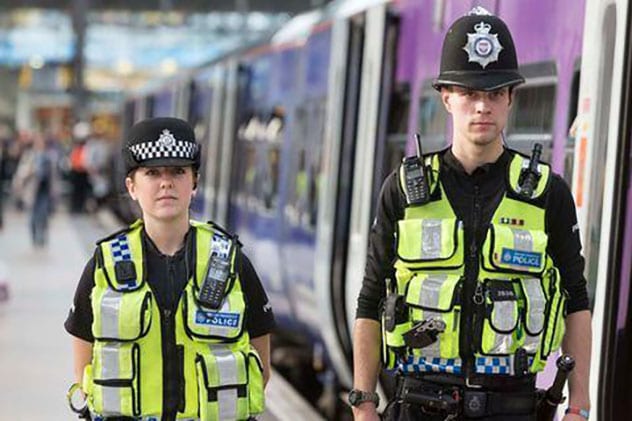
Marie Dinou was the first person convicted under the Coronavirus Act 2020. On March 28, the British Transport Police (BTP) spotted Dinou “loitering between platforms” at Newcastle Central Station. She was also accused of travelling without a valid ticket. This prompted the BTP to call the regular police. The officers detained the 41-year-old for failing to comply with the Coronavirus Act 2020 and refusing to provide her “identity or reasons for journey.”[7]
Dinou was immediately taken to a cell, where she remained in police custody for 48 hours. Dinou appeared at North Tyneside Magistrates’ Court. The District judge sent the corona criminal back to the cells, however, after she refused to identify herself. The judge found the woman guilty of violating the lockdown rules and slapped her with a £660 ($800) fine. The proceedings, which were conducted in a single hearing, took place in Dinou’s absence.
But the police and judiciary were left red faced when it emerged they had orchestrated an entirely wrongful prosecution. Kirsty Brimelow, the chair of the Bar Human Rights Committee, weighed in on the matter: “It is a mess. She was prosecuted under the Coronavirus Act Sch 21. She committed no offence under this Act.”[8] It turned out that offences committed under Schedule 21 only apply to individuals who are considered “potentially infected.” And the cops are only permitted to detain a potentially infected person for the purposes of making them undergo testing or self-isolation. To make matters worse, the act does not give the police the power to demand a person’s identity or reasons for travel.
Top 10 Unsolved Mysteries Of The COVID-19 Pandemic
5 Charging a Homeless Man for Breaking Lockdown
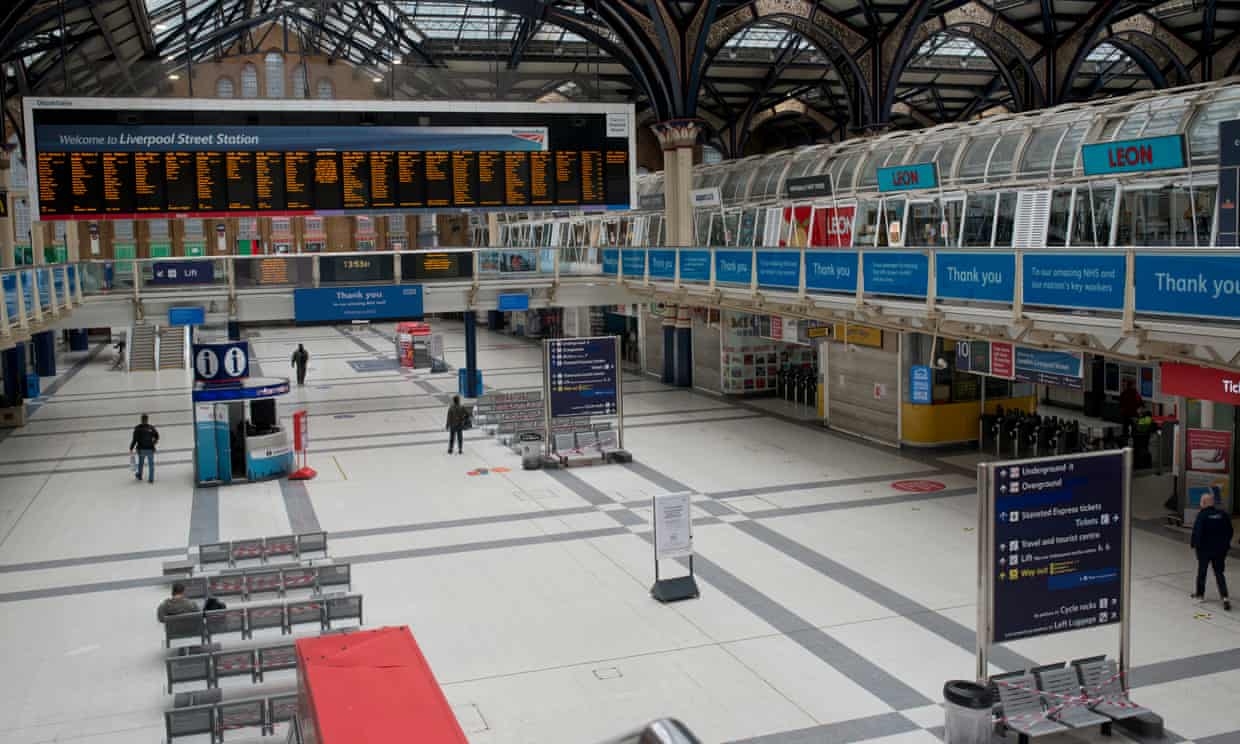
In late April, a Metropolitan Police officer confronted a homeless man at Liverpool Street Station in London. The man, Sultan Monsour, told the officer that he lived in Stratford, before admitting he was actually homeless. But the cop’s patience eventually “ran out.” Upon seeing the rough sleeper for a second time, 10 days later, the officer charged him with violating the lockdown. The charge sheet stated: “[W]ithout reasonable excuse, other than as permitted by the regulations, [you] were outside of the place where you were living, namely no fixed address or refused to provide your address details.”[9]
On May 4, District Judge Alexander Jacobs expressed confusion during a hearing at the Westminster Magistrates’ Court. “If he is homeless then the charge ‘that he left the place he was living, namely no fixed address’ doesn’t make sense to me,” argued Judge Jacobs. The judge also seemed baffled by the arresting officer’s remarks that the accused was arrested for “breaching coronavirus conditions because he had no address.” The prosecution remains insistent the case, which remains set for 22 June 2020, will go ahead.
Such incidents are not uncommon in Britain’s capital. Journalist Brendan O’Neill witnessed scores of officers marching through St. James’s Park in London, bellowing covid regulations at the homeless. “The most despicable thing I saw was a policeman telling an elderly homeless gentleman to move on. Inarticulately, the man explained he had nowhere else to go,” said O’Neill. When the journalist questioned the officers’ heavy-handed approach, one cop retorted “I don’t make the rules.”[10]
4 The War on Front Yards
In 1604, an English jurist named Sir Edward Coke stated “Every man’s house is his safest refuge.” But this right seemingly no longer applies in covid Britain. On April 9, a police officer in Rotherham was filmed telling a man that his children were not allowed to play in the family’s front yard. The officer instructs the father, Daniel Connell, to return to his home. When the 23-year-old tells the cop that he plans to go shopping, the officer responds: “You’ve already been to the shop once. I’ve seen you with two cans of pop.”[11] No such garden ban exists in Britain. South Yorkshire Police were forced to apologize after the incident made national headlines.
Rafael Todes, one of Britain’s most renowned musicians, received similar words of advice. The violinist staged a series of outdoor concerts for residents on his street. The string quartet, which boasted Rafael’s wife and two children, played outside the family’s front door. The music was designed to lift the community’s spirits during the lockdown. The event was also streamed around the world to raise money for St. John’s Hospice in London. But two, admittedly apologetic, Metropolitan Police officers shut the event down.[12] Neighbors had gathered outside their homes, allegedly in violation of the lockdown.
The Todes family played Dmitri Shostakovich’s String Quartet No. 4. Shostakovich lived through Joseph Stalin’s reign of terror, during which the authorities arrested many of the composer’s contemporaries and family members. “The irony is, Shostakovich wrote this piece and had his suitcase packed at the time, terrified of being arrested by Stalin,” Todes explained.[13]
3 Banning Park Benches

Many benches across Britain are now wrapped in reams of red and white tape, with officers patrolling seating areas. The National Police Chiefs’ Council has even issued official guidance on precisely when the public may rest at benches. “A short walk to a park bench, when the person remains seated for a much longer period,”[14] is one potential scenario that violates the police guidance.
Cops in Glasgow, Scotland, recently instructed a disabled woman and her autistic son to leave Glasgow Park. The two were resting on a park bench after taking their daily walk. The woman, Kiki Flood, has a series of metal plates in her body after suffering a traumatic accident. She also suffers with an inner ear condition that affects her balance. The cops told Ms. Flood, who walks with a cane, that her disability was no excuse.[15] During a separate incident in the same park, officers told a resident with Ehlers-Danlos syndrome, a connective tissue disease, that she was not permitted to use the bench. Clutching her bags of groceries, the woman endured extreme joint pain as she journeyed back home.
On April 5, a slightly more belligerent member of the public was reprimanded for sitting next to the River Thames in London. When confronted, the cheeky woman insisted she was exercising her mind while she watched the sunset. The officers arrested the woman and took her back home in a police van. They then “de-arrested” the covid crook and handed her a fixed penalty notice.[16]
2 Hunting a Plague Doctor
A teenager from Norwich, England, was recently spotted wandering around in a plague doctor outfit. Footage of the boy, taken in the rural village of Hellesdon, quickly attracted the attention of the police. At temperatures of 68 degrees Fahrenheit, the boy waltzed around his village in a long, black coat and plague doctor mask. The mask was originally worn by quacks during the 14th century bubonic plague. At the time, many believed the plague was spread by foul smells. The distinctive beak contained aromatic substances that many practitioners believed would stop the spread of the disease by warding off “bad air.”
The Norfolk Police constabulary hunted the prankster down and issued words of caution. “The individual has been spoken to about the consequences of his actions and the effects they may have on some people in the local community,”[17] said a police spokesperson. However, the cops conceded that no crime had actually taken place.
1 “I’ll Make Something Up”
On a sunny April afternoon, Adam Kidger was on his way to collect a quad bike in Accrington, England. The Lancashire Police pulled the 24-year-old over and accused him of breaking the lockdown rules. One of the officers adopts a somewhat aggressive stance: “You wanna f**king step [up] to me, and puffing your chest out – something like that – then, fine, I’ll lock you up. We’ll do that, shall we?” When the man inquires about what crime he has committed, the officer responds: “I’ll make something up: public order [offence], squaring up to a police officer. Shall I do that? Who are they gonna believe, me or you?” The puzzled man gives the Lancashire Police a heads up, pointing towards the camera to show the officer he is being filmed. The oblivious cop storms off. His colleagues remain silent.
Footage of the officer’s conduct was leaked to the British press. The Lancashire Police disavowed the cop’s actions and reported itself to the police conduct watchdog.[18] While police corruption appears to be the cop’s most obvious failing, he was also in breach of the social-distancing guidelines.
Top 10 Striking Images That Show Covid-19’s Impact On The World
